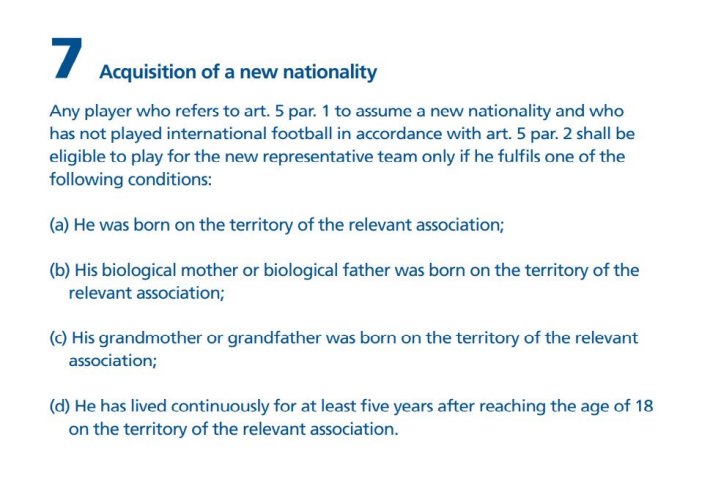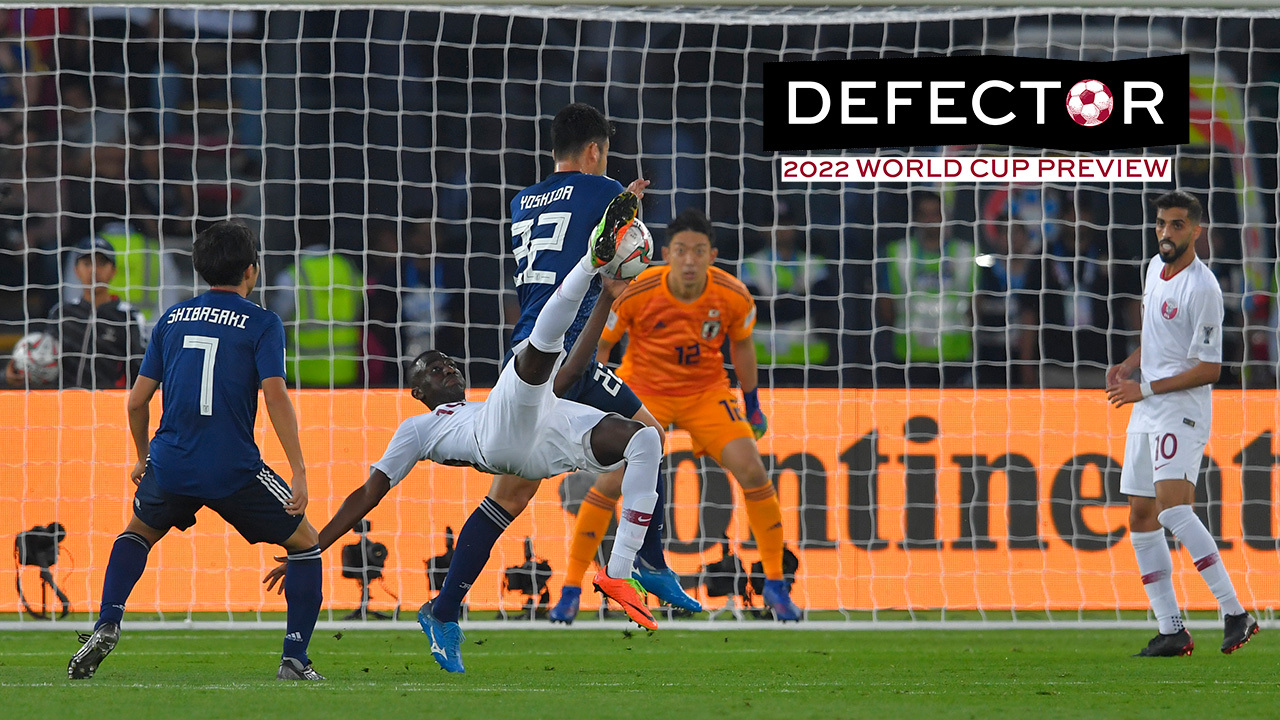It's almost time for the 2022 World Cup. To help get you ready, we will be providing you with precious information about every team in the tournament. You can read all of our World Cup previews here.
When the World Cup opens on Nov. 20, it will be a day of firsts. Qatar will become the first Arab nation to host the tournament, which will be the first ever played during the winter months in the Northern Hemisphere. The Qatari men's national team, which joined FIFA in 1970, will step onto the field and play a World Cup group-stage game for the first time in its history. Normally, you'd find cause for celebration on such a historic day, but the story of how we got here is not exactly heartwarming. Qatar is hosting the World Cup because of its willingness to bribe FIFA officials and abuse, exploit, and kill thousands of migrant workers; the games will be played in the winter because it is literally too hot to play soccer in Qatar in the summer; the Qatari national team qualified for the tournament not only with a host nation exemption, but with a team assembled under somewhat dubious circumstances.
Though they were given the customary gift of the host nation's automatic qualification, Qatar is not to be entirely written off. They will face stiff competition in Group A, but this is a team that has proven itself capable of holding its own in international competitions. Qatar won the 2019 Asian Cup, conceding just one goal throughout the tournament and beating Japan 3–1 in the final. They were then invited to the 2021 CONCACAF Gold Cup, where they got all the way to the semifinal before losing 1–0 to the United States. In a just and moral world, would these guys be anywhere near a World Cup game? Perhaps not. But a just and moral world is not the one we inhabit, and the simple fact of the matter is that Qatar's team can actually play some damn soccer.
Who Is Their Main Guy?
Their main guy is Almoez Ali, a striker who dominated the Asian Cup in 2019. The 26-year-old scored an eye-popping nine goals in seven appearances during that tournament, and he followed that up with four goals in five matches at the 2021 CONCACAF Gold Cup. He started six more games during the 2022 World Cup qualification process (Qatar participated in these games in order to qualify for the next Asian Cup), and get this: He scored six goals. I don't care who you are or what kind of far-flung confederation you play your international soccer in—if you're scoring better than a goal per game over the course of three years, you're a baller.
Ali cuts a slight figure for a striker, listed at 5-foot-11 and just 150 pounds. He's not the type to physically dominate his opponents with muscly hold-up play or blurring runs behind the defense, but what he lacks in power he makes up for with nimble feet and a deft touch. Ali is always well-positioned in the opposition box, and when he receives the ball in there he's very good at using his quick feet to create space, shift the ball into an ideal shooting position, and finish with pinpoint accuracy. If there's one goal that neatly sums up who Ali is as a player, it is probably the one he scored in the 2019 Asian Cup final against Japan. Get a load of this three-touch bicycle kick:
WHAT A GOAL TO PUT QATAR AHEAD! 😱#AsianCup2019 pic.twitter.com/GyZkWlWT1T
— DAZN Boxing (@DAZNBoxing) February 1, 2019
Is poor tiny Ali going to spend the majority of his time on the field during the group stage picking grass out of his teeth after getting planted into the ground by Virgil van Dijk and Kalidou Koulibaly? Yes, most likely. Will it be extremely funny if he manages to dance around either of those tanks in a tight space and tuck a toe-poke goal inside the far post? Yes, that will be extremely funny.
Who Is Their Main Non-Scoring Guy?
I'll level with you: It's pretty hard to find much information about Qatar's non-goal-scoring guys. Turns out there's not a lot of Western coverage of guys who have spent most if not all of their careers playing international soccer for a team that's never been to the World Cup, and playing club soccer in the Qatar Stars League. Nevertheless, I will draw your attention to Boualem Khoukhi.
Born in Algeria but later naturalized as a Qatari, the 32-year-old has made 99 appearances for the national team since debuting for in 2014, and he's played a wide variety of roles in those games. Khoukhi originally played as a winger, was then converted into a central midfielder, and now plays center back, anchoring The Maroon's defense.
What's neat about Khoukhi is that he hasn't lost the skills that originally had him cast as an attacking player. But wait! I can hear you protesting. This section is supposed to be about a non-goal-scoring guy! It says so right up there! I want you to know that I hear these complaints, and I reject them. That's because if a team has a central defender who can stuff like this:
هدف #العنابي الاول عن طريق بوعلام خوخي .#مرسال_قطر #قطر_الامارات pic.twitter.com/qhUnosaNg8
— مرسال قطر (@Marsalqatar) January 29, 2019
And this:
هدف السد الاول على الغرافة #دوري_نجوم_QNB pic.twitter.com/wRFsrR9nPY
— قنوات الكاس (@alkasschannel) December 13, 2020
It would be a crime not to mention him. Here's hoping Khoukhi somehow finds some opportunities to get forward during the group stage, because there are few things more satisfying than a center back hitting a banger.
Where's The Beef?
Which teams or players does Qatar not like? Do Qatar's players like each other? We investigate their potential enemies.
If the very existence of the Qatar World Cup is evidence of just how far money and shameless ambition can go in the quest to gain worldwide prestige and attention, then so too is the national team itself, albeit to a far lesser degree. That's a long way of saying that parts of the soccer world have almost as much beef with The Maroon itself as they do with the country the team represents.
If Qatar's national team has historically been defined by one thing, it's the brazenness with which it has attempted to naturalize players who have no real link to Qatar. Back in 2004, FIFA had to convene an emergency meeting in order to tighten up the federation's naturalization rules because Qatar was on the verge of handing over citizenship to a handful of Brazilian players who had zero connection to the country. Even with tighter regulations in place, Qatar went on trying to stack its national team with non-Qatari players. They aren't quite as obvious about it as they used to be, but it's not uncommon to see the team take the field with 4-5 naturalized players in the starting XI.
Qatar is not the only country to do this, of course. In fact, the USMNT's World Cup hopes rest with several high-profile players with tenuous connections to the United States. Qatar's use of naturalized players still raises the ire of their opponents, though, in part because it's not always exactly clear whether Qatar is doing so according to FIFA's rules. Currently, any player who wants to change their nationality has to meet one of the following criteria:

Things get a little ... I guess you could say murky when it comes to Qatar's explanation for how a player like Almoez Ali, who was born in Sudan, has previously satisfied those criteria. At the 2019 Asian Cup, the United Arab Emirates filed a formal complaint against Qatar, alleging that Ali and another player, Iraqi-born Bassam al-Rawi, should not have been allowed to represent Qatar in the tournament. Both players had moved to Qatar at a young age and came up through the country's Aspire Academy, a well-funded training center that was established with the explicit goal of recruiting and naturalizing young players from around the world, particularly Africa.
Ali entered the Aspire Academy when he was just seven years old, and has lived in Qatar for most of his life. Still, the UAE federation argued that because he was 22 years old at the time of the Asian Cup, he could not have satisfied final criteria for naturalization by living in Qatar for five continuous years after reaching the age of 18. Qatar countered this argument by claiming that Ali's mother was actually born in Qatar, thus satisfying the second criteria. The case eventually made its way all the way to the Court of Arbitration for Sport in 2020, at which point the Qatari federation apparently presented the court with a copy of Ali's mother's Qatari birth certificate, thus confirming Ali's eligibility. Bassam's eligibility was not investigated by the court because the UAE dropped him from their appeal after he was suspended for the Asian Cup semifinal.
None of this will be a problem for Ali in the World Cup, as he's now 26, but don't be surprised if some eyebrows get raised at how the national team tends to conduct itself when it comes to filling out the roster. As we all know, the only good and righteous way to get foreign-born players on the roster is to find guys who have spent their entire lives living elsewhere, but just so happen to have a Surinamese father with dual American citizenship.
Most Likely To Go David Ospina Or James Rodríguez Mode
Who is Qatar's best candidate for a breakout performance that earns them a career-changing transfer? Might this potential post-tournament transfer go well, like when Colombia’s James Rodríguez went to Real Madrid after starring in the 2014 World Cup? Or could it go poorly, like when Colombia’s David Ospina went to Arsenal after starring in the 2014 World Cup?
This belongs to 25-year-old winger Akram Afif, who is The Maroon's best attacking talent aside from Ali. He's scored 23 goals in 83 career appearances for the national team, and he's also the rare Qatari-born player who has actually gained some traction in European soccer. Way back in 2016, he was signed by Villarreal, making him the first Qatari player in history to make it to La Liga. Things didn't really work out for him there: Villarreal loaned him out to Sporting Gijón almost immediately, and then to Belgium the following season, and then to Al Sadd in Qatar, where Afif now plays on a permanent basis. The Qatari league suits him just fine, though, as he's scored 62 goals (lol) and handed out 53 assists (lol!) in just 77 appearances there.
Some might argue that Afif, despite clearly being the Leo Messi of the Qatar Stars League, is ineligible for inclusion in this section because he has already gone David Ospina Mode once in his career, as evidenced by his failed move to Villarreal. I, however, choose to believe in the young fella. He's still just 25, which means there is plenty of time left for him to score a few nice goals in the group stage, regain some of the buzz that was around him early in his career, and secure himself a move to, ah heck I don't know, Benfica? Why not!
David Ospina Mode Probability Score: 37.6
James Rodriguez Mode Probability Score: 19.3
Notable Moment In Soccer History
After Qatar scored a goal in their 4-0 victory over the UAE in the 2019 Asian Cup semifinal, a bunch of UAE fans threw shoes at them!
Fun Geographical Fact
You are by now aware of the fact that it is quite hot in Qatar, but maybe you haven't really reckoned with what it means to live in a place that recorded an all-time high temperature of 122.7 degrees in 2010. Did you know, for example, that Qatar now has to use outdoor air-conditioning systems in order to keep the country livable? From the Washington Post:
To survive the summer heat, Qatar not only air-conditions its soccer stadiums, but also the outdoors — in markets, along sidewalks, even at outdoor malls so people can window shop with a cool breeze. “If you turn off air conditioners, it will be unbearable. You cannot function effectively,” says Yousef al-Horr, founder of the Gulf Organization for Research and Development.
Washington Post
If you want to get yourself good and sad about the current state of the world, a good way to do that is to just spend some time thinking about Qatar. Here we have a Connecticut-sized peninsula jutting out from Saudi Arabia into the warming waters of the Persian Gulf, heating up faster than any place on Earth outside of the Arctic, exporting more liquified natural gas than any other country on the planet, and pumping cool air onto its sidewalks just so that people don't die while walking to and from the store. Pretty neat!
Good Flag Or Bad Flag?

I kind of dig it! I think it's a decent flag.
Good Anthem Or Bad Anthem?
Not into this. Sounds like a show tune.
How Can They Win It All?
Qatar's path to World Cup glory is simple: The team needs to play hard, believe in itself, and hope that FIFA makes a last-minute rule change, under the "strong advisement" of the Qatari ruling family, that the World Cup's host nation automatically advances to the final.






